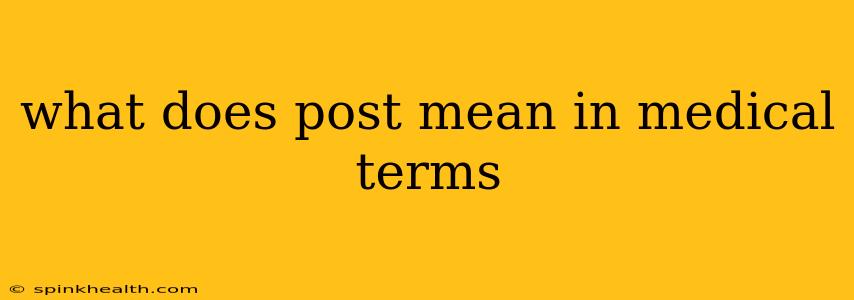What Does "Post" Mean in Medical Terms? A Journey Through Medical Jargon
The seemingly simple word "post" takes on a significant role in the world of medical terminology. It's not just about delivering letters; in medical contexts, "post" signifies after or following. Understanding this seemingly small word is key to interpreting medical records, understanding diagnoses, and navigating conversations with healthcare professionals. Let's unravel the mystery of "post" in the medical realm.
My journey into deciphering medical terminology began with a simple question: "What does 'post' mean in medical terms?" The answer, while straightforward, opened a fascinating window into the precision and clarity demanded by the medical profession.
The Core Meaning: After or Following
At its heart, "post" in medical language means "after" or "following." It indicates a temporal relationship, specifying an event or condition that occurs subsequent to another. Think of it as a chronological marker, signaling the order of events in a patient's medical history.
This simple definition unlocks the meaning of a wide array of medical terms. For instance, "postoperative" refers to the period after a surgical procedure. Similarly, "postpartum" describes the time after childbirth. These examples highlight the consistent use of "post" to denote a time sequence.
Common Medical Terms Using "Post"
Let's delve into some specific examples to solidify our understanding.
1. Postoperative (Post-op): This term refers to the period after a surgical operation. Postoperative care is crucial for recovery and includes monitoring vital signs, managing pain, and preventing complications. Doctors often discuss potential post-operative complications during pre-operative consultations to manage patient expectations.
2. Postpartum: This refers to the time period after childbirth, typically lasting around six weeks. During this phase, mothers experience various physical and emotional changes as their bodies recover from delivery. Postpartum care includes monitoring the mother's physical and mental well-being.
3. Posttraumatic: This term describes conditions that occur after a traumatic event. Posttraumatic stress disorder (PTSD), for instance, is a mental health condition that can develop following a terrifying experience.
4. Postprandial: This might sound less familiar, but it refers to the period after a meal. For example, postprandial blood glucose measures blood sugar levels after eating. This is a crucial measurement for managing diabetes.
5. Postinfectious: This denotes conditions or symptoms that appear after an infection. Sometimes, infections can trigger secondary problems. For example, Post-infectious glomerulonephritis is a kidney inflammation that can follow a strep throat infection.
How to Understand "Post" in Your Medical Records
When encountering "post" in your medical records or doctor's notes, remember its core meaning: after or following. The word following "post" will clarify the specific event or condition. Always consult your doctor if you have any questions about your medical records or diagnosis.
What other prefixes are used similarly in medical terminology?
Medical terminology relies heavily on prefixes to convey meaning efficiently. Similar to "post-", prefixes like "pre-" (before), "intra-" (within), and "peri-" (around) provide crucial context to medical terms. Understanding these prefixes enhances one's comprehension of medical language.
What are some examples of post-surgical complications?
Post-surgical complications can range from minor to severe, depending on the type of surgery and the patient's overall health. These can include infection, bleeding, blood clots, and adverse reactions to anesthesia. The likelihood of complications varies greatly between surgeries and patients.
How long does the postpartum period typically last?
The postpartum period typically lasts around six weeks, although the recovery process can vary among individuals. During this time, the mother's body undergoes significant physiological changes as it returns to its pre-pregnancy state.
By understanding the simple yet powerful role of "post" in medical terminology, we gain a more profound insight into the language of healthcare. It's a small word with a big impact, enabling precise communication within the medical community and facilitating informed patient understanding.

